#prevent colon cancer with screening
Text
This is absurd. The patient is high risk for a myriad of cancers (including colon) due to a history of bladder cancer.
Bureaucratic red tape in a developed country delayed his life saving screening for 5+months!
If he could get to North America, we could see him this week.
Couldn't Aussie stars like Rusell Crowe or Mel Gibson help this high risk cancer survivor get to the USA for a simple colonoscopy?
youtube
#colonoscopy#australian#Do Better Aussie Health#prevent colon cancer with screening#stop colon cancer EARLY with screening
31 notes
·
View notes
Text
Colorectal Cancer: Important Types, Risk Factors, Treatment, And Prevention
Colorectal Cancer: Important Types, Risk Factors, Treatment, And PreventionIntroductionWhat is Colorectal Cancer?Types of Colorectal Cancer Adenocarcinomas Carcinoid Tumors Gastrointestinal Stromal Tumors (GISTs) Lymphomas SarcomasRisk Factors for Colorectal Cancer Age and Gender Family History Personal Medical History Lifestyle Factors Inflammatory Bowel Disease (IBD)Symptoms and Early Detection…

View On WordPress
#Adenocarcinomas#Bowel Cancer#Carcinoid Tumors#Chemotherapy for Colorectal Cancer#Colon Cancer#Colorectal Cancer#Colorectal Cancer Awareness#Colorectal Cancer Diagnosis#Colorectal Cancer Prevention#Colorectal Cancer Screening#Colorectal Cancer Staging#Colorectal Cancer Surgery#Colorectal Cancer Treatment#Early Detection of Colorectal Cancer#Gastrointestinal Stromal Tumors#Genetic Risk of Colorectal Cancer#Healthy Diet for Colorectal Cancer#Immunotherapy for Colorectal Cancer#Lymphomas#Radiation Therapy for Colorectal Cancer#Rectal Cancer#Risk Factors for Colorectal Cancer#Sarcomas#Symptoms of Colorectal Cancer#Targeted Therapy for Colorectal Cancer
0 notes
Text
Hey hey hey- its MELANOMA AWARENESS MONTH!
Put your sunscreen, hat, longsleeve, full coverage bathing suit, etc on!
April 2016 I had a malignant melanoma removed from my back- I still have a significant scar as a reminder. My husband had a melanoma removed a few years after that and we have been vigilant since.
Unfortunately- I had a mole come back after my last visit as a “severely atypical nevi” and had to have a surgical excision( today). These moles or nevi are not ALWAYS cancer or dangerous- but from what I gather, convert easily to melanoma. Given my sordid history with melanoma- the choice was a 2.5cm surgical incision/ removal. I was grateful it was less than the 11cm from the previous melanoma. However- this one is slap dab in the middle of my abdomen. So now, thanks (likely) to my idiotic youth and bikini choices- I will sport- not a cute bikini- but a large surgical incision on my back from 2016 and a medium sized one on my abdomen from today.
Please- be careful. No matter what beautiful skin tone you are- be careful and get SCREENED.
We can PREVENT two cancers- SKIN and COLON. Be smart and screen regularly for both.
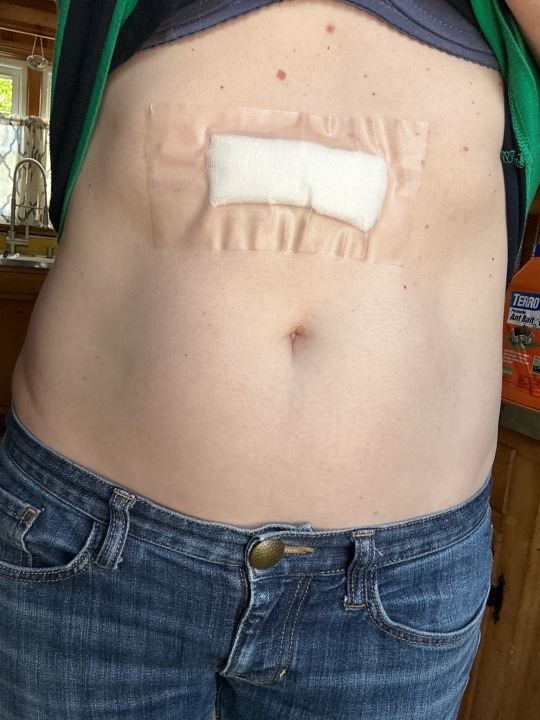

(Abdomen from 5/5/23). Back from (4/2016)
#melanoma#skin cancer#melanomaawareness#skincancerawareness#np#prevention#surgery#nurse#rn#nursing#registered nurse#nurblr#medblr#doctor#patient
120 notes
·
View notes
Text
The recent rise in "personal responsibility" conditions is honestly so concerning. Things that were once considered luck of the draw or the result of a bad environment are now being turned into morality issues, and the result is a decline in quality of medical care.
If you're fat or are considered clinically obese (BMI of 30+; these do not always overlap but both are treated poorly in the U.S. health system), you've dealt with this for ages, and it's spreading to other conditions because insurance companies have realized that if they can find a way to blame you, they have an argument to deny you coverage. A lot of these things can be quality of life issues for years before (or even if) they turn deadly (ex. arthritis), but I've watched the wording around things as significant and immediate as acute cancer cases change to blame the individual who's fallen ill.
Those screening guidelines for cancers that are common and easy to screen for and moving earlier and earlier in a person's life, and while I don't have a record of it because it's anecdotal and I'm not going to violate this family's privacy, I've got a friend who's father was denied partial coverage for their colon cancer treatment because he didn't start screening at 45. The man in question started screening when he turned 50 in 2017, before the guidelines were changed.
Nearly every medical condition I've had in the past ten or so years has been blamed on myself or my parents, on what I eat, what I do, anything the doctors could come up with to say "this was 100% preventable, and it's on you for not preventing it," completely ignoring socioeconomic factors, family history, or any other context of the situation in question. I've been blamed for getting a concussion by being too active (dropped a flagpole on my head in color guard), and in the same breath told I need to exercise more to lose weight and that if I had been exercising more, I wouldn't have pulled the shoulder muscle I was seeing another doctor in the same building about an hour after the neurology appointment for my concussion. I'd joined color guard specifically to get more active and more involved by the way, but it was still my fault for two injuries caused by accidents. My clumsiness and my newness to the sport were turned into moral failings.
I only see this getting worse and worse, so put your foot down with your doctor if they try to blame you for anything, get it notated in your chart that they wanted to blame you, and prepare for some long-ass calls with your insurance cause pretty soon, you could cross at a crosswalk properly and still be blamed if a car runs a red light and hits you.
90 notes
·
View notes
Text
Cancer in Men: Common Types, Symptoms, and Treatment Considerations
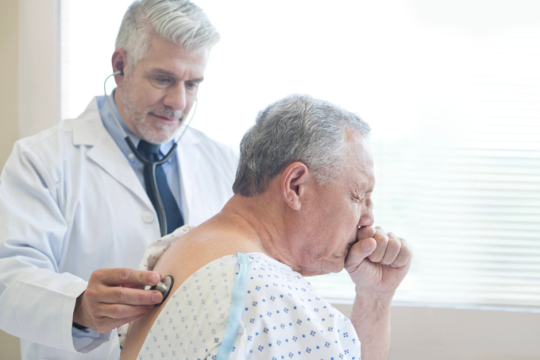
Cancer is a disease that occurs when abnormal cells grow and spread uncontrollably in the body. It can affect any organ or tissue, and it can cause various symptoms depending on the location and stage of the cancer. Cancer is among the leading causes of death in men worldwide, and some types of cancer are more common or more deadly in men than in women.
Some of the most common types of cancer in men are:
Prostate cancer: This is the most common cancer in men, affecting the prostate gland that produces semen. It usually grows slowly and may not cause any symptoms until it is advanced. Some possible signs include difficulty urinating, blood in urine or semen, erectile dysfunction, or pain in the lower back or pelvis.
Lung cancer: This is the leading cause of cancer death in men, often due to smoking or exposure to other lung irritants. It can affect one or both lungs and may cause symptoms such as coughing, chest pain, shortness of breath, wheezing, or coughing up blood.
Colorectal cancer: This is the third most common cancer in men, affecting the colon or rectum. It can cause symptoms such as changes in bowel habits, blood in stool, abdominal pain or cramps, weight loss, or fatigue.
Skin cancer: This is the most preventable type of cancer, usually caused by exposure to ultraviolet (UV) radiation from the sun or tanning beds. It can affect any part of the skin and may appear as a new or changing mole, a sore that does not heal, a red or scaly patch, or a growth that bleeds or itches.
Head and Neck cancers: This is the most common cancer in men in India. The biggest risk factor is chewing tobacco, drinking too much alcohol and HPV infections. Tobacco use is the most common cause of head and neck cancers.
Other types of cancer that are common or serious in men include bladder cancer, kidney cancer, liver cancer, pancreatic cancer, testicular cancer, and leukaemia.
The treatment options for cancer depend on the type, stage, location, and overall health of the patient. Some of the common treatments include surgery, radiation therapy, chemotherapy, immunotherapy, targeted therapy, hormone therapy, and palliative care. The goal of treatment is to remove or destroy the cancer cells and prevent them from spreading or recurring.
The best way to prevent or detect cancer early is to adopt a healthy lifestyle and get regular screenings and check-ups. Some of the preventive measures include:
Avoiding tobacco use
Limiting alcohol consumption
Eating a balanced diet rich in fruits and vegetables
Maintaining a healthy weight
Being physically active
Protecting yourself from the sun
Getting vaccinated against certain viruses that can cause cancer
Getting screened for prostate cancer, lung cancer, colorectal cancer, and skin cancer according to your age and risk factors
Cancer can be a scary and challenging diagnosis for anyone. However, with proper care and support, many men can survive and thrive after cancer. If you have any concerns or questions about cancer, talk to your doctor or a trusted healthcare professional. They can help you understand your risk factors, symptoms, diagnosis, treatment options, and coping strategies. Remember that you are not alone in this journey, and that there are many resources and support groups available to help you and your loved ones. Cancer can be a tough opponent, but you can fight back with courage and hope.
For more details click on the link 👇🏻
https://bit.ly/3osreVo
#ICANWIN#YESITSRAM#FightAgainstCancer#CancerAwarenessMatters#TogetherAgainstCancer#CancerWarriorsUnite#EmpoweredByHope#RaisingCancerAwareness#IgniteTheFight#ConquerCancerTogether#InspireHopeForSurvivors#CancerFreeFuture
48 notes
·
View notes
Text
The "Barn Door Explanation" of Cancer Screening

Picture this:
You have a barn with a bird, a turtle, and a rabbit inside. Maybe one day you decide to open the door, only to realize that the animals are unsecured, and they all make a beeline for the new exit.
The bird flies out immediately. Even if you pulled out all the stops and slammed the door, the bird would still get out. Nothing you can do.
The turtle's "beeline" meanwhile is essentially so slow you could leave the door open while you did whatever you were going into the barn to do, and close it afterwards without even needing to care that the turtle might get out.
The rabbit is where you both need to do something and have a chance to prevent it's escape- if you realize the situation and close the door fast enough, you can keep the rabbit in the barn.
So what does frankly weird farm setup have to do with cancer screening programs?
Well I'm so glad you asked.
Cancer is the abnormal and uncontrolled replication of a type of cell in the body. These abnormal cells over-replicate in a body tissue, causing them to burn lots of energy, put pressure on healthy tissue and prevent the normal function of that tissue. Cancer can be painful and life-threatening, treatment for cancer is improving but still not particularly reliable, and diagnoses cause a lot of fear and uncertainty. Cancer all around sucks.
[TL;DR: Assuming you are of average risk for any particular cancer, you may want to consider skipping prostate, thyroid, and breast cancer screenings. You definitely want to get your colonoscopies and pap smears, though. Don't take definitive medical advice from some random guy on the internet. Talk to your doctor and all that.]
Certain cancers move faster than others. For example, did you know that if you die of old age, there's an almost 100% chance of you dying with thyroid cancer? That 50% of prostate-havers over 60 and 75% of prostate-havers over 85 have prostate cancer? That in the last 3 decades, 1.3 million breast-havers have been diagnosed with and treated for a breast cancer they would never have died of or possibly even noticed, regardless of treatment?
This is because, using the analogy above, many of the common types of these cancers are "turtles". No matter what you do, whether you know you have them or not, treated or not, they won't kill you. You'll die with them, but not of them.
And at the same time, in 2021, 2,200 people died of thyroid cancer, 34,130 of prostate cancer, and 44,130 people of breast cancer. And unfortunately, most of these deaths were from fast-growing, aggressive cancers for whom the earliest screening in the world wouldn't have helped. The "birds" of the cancer world, if you will. No matter how quickly they were recognized or treated, the likelihood that they would ultimately cause death was very high.
In order for it to have a useful screening program, you need a cancer that is mostly rabbits. Cancers where the screening identifies cancers or pre-cancers that are difficult to detect without screening, likely to be deadly without treatment, but for which there are treatments that are effective.
Though widely used for some time, prostate, thyroid, and breast cancer screening programs have almost no impact on cancer death rates. This has been calculated both from comparisons between countries with high rates of screenings and those with low rates of screenings, and by comparing death rates before and after screening programs were initiated. Yes, we are finding and treating more cancers when there are widespread screening programs, but the actual cancer deaths are staying pretty static. The screenings make no difference in survival.
Worse, they put people through surgery, chemotherapy, radiation, and potentially lifelong disability for cancers that otherwise have just been undetected until death.
But don't write off screenings entirely. The two cancers most amenable to screening- ones that are majority rabbits- are colon cancer (having a colonoscopy every 10 years after age 45, or one of a number of other screening alternatives every 1-5 years) and cervical cancer (a pap test every 3 years after age 25 if you have a cervix). While more unpleasant than a blood test or mammogram, these are two tests that can identify abnormal growths before they become cancer so that they can be removed with a minimal of collateral damage. Nearly all of these two cancers are rabbits, and most of them can be caught before they even become cancers with regular screenings.
Also note that this post is just about cancer. Screenings for blood pressure, diabetes, and other chronic diseases can make a big difference in survival and quality of life.
For more information on how risk is balanced in science and healthcare, consider reading Dr. Paul Offit's Pandora's Lab and You Bet Your Life. Both of these books substantially changed how I see healthcare and allowed me to think a lot more freely about my own healthcare choices.
114 notes
·
View notes
Text
Early Detection Saves Lives: The Significance of Oral Cancer Screenings
In today’s world, where health awareness is becoming increasingly prevalent, we often hear about the importance of cancer screenings. Screenings for breast, lung, colon, and prostate cancers are commonly recognized and frequently discussed. Yet, an equally critical health check that merits increased focus is the examination for oral cancer.
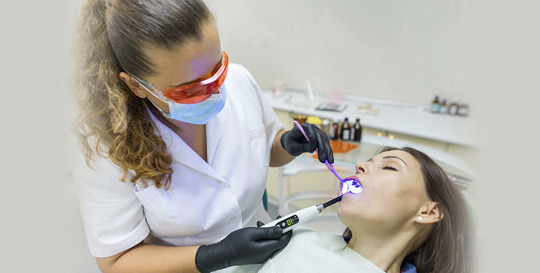
Oral cancer, though not as widely highlighted, constitutes a serious and potentially fatal ailment impacting numerous individuals annually. In this article, we’ll explore the significance of oral cancer screenings, their role in early detection, and why they should be a routine part of your dental care.
Understanding Oral Cancer
To grasp the significance of these screenings, it’s essential to first comprehend what oral cancer entails. This malignancy can manifest in any area of the oral cavity, including the lips, back of the throat, tongue, gums, inner cheeks, as well as the ceiling or base of the mouth. Oral cancer initiates from atypical cellular proliferation, which can form a mass and potentially metastasize if not addressed promptly, underscoring the importance of early discovery.
The Role of Your Dentist
Your Ralston dentist is not only concerned with your teeth and gums; they play a vital role in monitoring your oral health, including the early detection of oral cancer. In the course of a routine dental visit, your practitioner in the 80002 area will conduct an examination for oral cancer as a routine part of their overall assessment.
Early Detection Matters
1. Improved Survival Rates: The most significant advantage of early detection through oral cancer screenings is the potential for better treatment outcomes. When oral cancer is identified at an early stage, the chances of successful treatment and survival dramatically increase.
2. Less Invasive Treatment: Early-stage oral cancer often requires less aggressive treatment, which can mean fewer side effects, quicker recovery, and a better overall quality of life for patients.
3. Lower Treatment Costs: The cost of treating advanced oral cancer can be significantly higher than treating it in its early stages. By detecting it early, patients can potentially avoid the financial burden of extensive treatments.
4. Reduced Pain and Discomfort: Advanced oral cancer can lead to more distress and discomfort for patients. Early detection can help prevent these distressing symptoms.
Risk Factors for Oral Cancer
Several risk factors improve the likelihood of developing oral cancer. These include:
– Tobacco use, including smoking and smokeless tobacco.
– Heavy alcohol consumption.
– Human papillomavirus (HPV) infection.
– Excessive sun exposure to the lips.
– A family history of oral cancer.
– Poor oral hygiene and dental care.
Anticipating an Oral Cancer Examination
An oral cancer screening is a painless and quick process that can be done during your regular dental checkup. Cosmetic dentist Arvada will visually inspect your mouth for any abnormalities, including red or white patches, sores, or lumps. They may also use specialized tools to examine your throat and neck for any signs of oral cancer.
The Importance of Self-Examination
While routine dental checkups are essential, you can also play a role in early detection by performing self-examinations at home. Be vigilant and look for any unusual changes in your mouth, such as persistent sores, difficulty swallowing, or changes in the color or texture of your oral tissues. If you notice anything concerning, don’t hesitate to contact your dentist.
Incorporating oral cancer screenings into your dental routine is vital for early detection and should never be overlooked. Catching oral cancer in its initial stages significantly boosts the chances of successful treatment and survival. Emphasizing preventative care and quick recognition is critical; therefore, maintaining optimal oral hygiene, reducing risk factors, and committing to consistent dental appointments are imperative. Various National Library of Medicine studies highlight how early diagnosis can enhance treatment effectiveness and survival rates.
At Ralston Creek Dental, our dedication lies in delivering all-encompassing dental services, oral cancer evaluations included, to our clientele in Arvada, CO. Your health and safety stand as our utmost concerns. Should you have any worries regarding your dental health or wish to arrange a consultation, please feel at ease to reach out to us. Timely intervention can be life-saving, and we are here to assist you toward a healthier dental future.
2 notes
·
View notes
Text
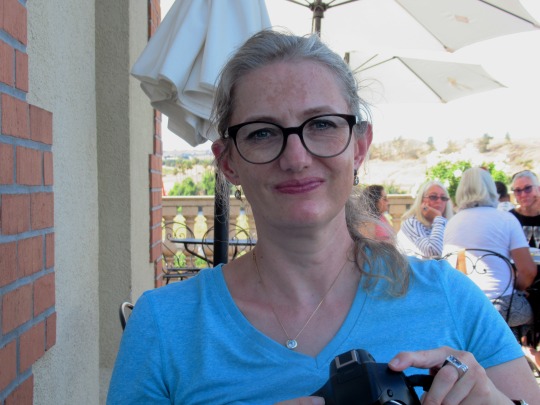





























National Dress in Blue Day
The idea for ‘National Dress in Blue Day’ was originally come up with by Anita Mitchell, a stage IV colon cancer survivor who had lost a close friend and her own father to the disease. Greatly saddened by the fact that both of those tragedies could have been prevented, Ms. Mitchell saw a need to bring greater awareness to cancer that not many people wanted to discuss.
So, in 2006, she worked with her children’s school to coordinate a recognition day. That very year in March, students who normally had to wear uniforms to class were allowed to wear a blue outfit of their choice, if only they made a $1 donation to colon cancer awareness.
There have been some hopes to turn all of March, and not just the first Friday of the month, blue by promoting colon cancer awareness all month long, much like National Breat Cancer Awareness Month takes place every October.
History of Blue Dress Day
Anita then brought the ‘National Dress in Blue Day’ concept to the Colon Cancer Alliance. ‘National Dress in Blue Day’ was first launched in 2009 by the Colon Cancer Alliance in a massive nationwide campaign. It was introduced to raise awareness of colon cancer as well as to recognise the bravery of those suffering from the disease, and the now nationally-recognized blue star was chosen to symbolize both the memory of loved ones lost to colon cancer and the perspective of a better future without the disease.
With its actions, the Colon Cancer Alliance hopes to encourage people to become more interested in the potentially fatal threat that is colon cancer, by for example getting screened regularly in hopes of being able to detect any warning signs before the situation becomes much more serious.
Diagnosis of cases of colorectal cancer through screening tends to occur 2-3 years before diagnosis of cases with symptoms, and thus screening has the potential to reduce colon cancer deaths by 60%. It has been found, in fact, that most colorectal cancers should be preventable altogether, through increased surveillance and lifestyle changes, such as simple diet changes or an increase in the amount of physical activity an individual does, which makes prevention a truly important aspect.
Carmen Marc Valvo, an American fashion designer, partnered with the Colon Cancer Alliance in 2011 to promote National Dress in Blue Day after hew own personal struggle with the cancer.
How to celebrate blue dress day
Individuals, companies and neighbourhood groups celebrate ‘National Dress in Blue Day’ by wearing blue and encouraging their friends, family and colleagues to do the same. There are many different ways this can be used to raise money. Proceeds raised through ‘National Dress in Blue Day’ are used to fund important research and prevention programs, as well as to provide support to patients.
As one example, businesses can allow their employees to wear jeans and a blue t-shirt instead of their usual uniforms, in return for a small fee. Some people both raise awareness and show support for friends or family members who have suffered or are suffering from colon cancer by wearing a shirt that says simply, “I’m blue for my son” or, “I’m blue for Sarah”.
An individual can also collect sponsorship from their friends and family in return for dressing head to toe in blue for a day – including clothing, shoes, make up and even hair dye! This money is then of course donated to the Colon Cancer Alliance, and used both to help survivors of colon cancer as well as do more research into possible ways to hopefully one day cure it completely.
Source
#National Dress in Blue Day#NationalDressinBlueDay#1 March 2024#USA#Morro Bay#Louis M. Martini Winery#California#Utah#Nevada#summer 2023#vacation#travel#landscape#cityscape#tourist attraction#landmark#original photography#first Friday in March#Yukon#British Columbia#Alberta#Canada#2022#Alaska#Whistler#Whitehorse#Omak#Washington#Napa#Domaine Carneros
2 notes
·
View notes
Text
Benefits Of Colorectal Treatment
Colorectal treatment can provide numerous benefits, particularly when addressing conditions and diseases affecting the colon and rectum. These benefits can include:
Disease Management: Colorectal treatment is essential for managing conditions such as colorectal cancer, Crohn's disease, ulcerative colitis, diverticulitis, and colorectal polyps. Proper treatment can help control the progression of these diseases and improve patients' quality of life.
Cancer Prevention and Early Detection: Colorectal treatment often involves routine screening methods like colonoscopy. Early detection of colorectal cancer through these screenings can significantly increase the chances of successful treatment and cure.
Cancer Treatment: For individuals diagnosed with colorectal cancer, treatment options can include surgery, chemotherapy, radiation therapy, immunotherapy, and targeted therapies. These treatments can help remove or control cancer cells, potentially leading to remission or prolonged survival.
Symptom Relief: Patients with colorectal conditions often experience symptoms such as abdominal pain, diarrhea, constipation, bleeding, and weight loss. Treatment can alleviate these symptoms and improve overall comfort and well-being.
Improved Quality of Life: Successful colorectal treatment can lead to an improved quality of life. Patients can experience fewer symptoms and regain their ability to carry out daily activities.
Prevention of Complications: Treating colorectal conditions promptly can prevent complications like bowel obstructions, perforations, and sepsis, which can be life-threatening.
Preservation of Organ Function: Some treatments, like surgery for colorectal cancer, aim to preserve as much organ function as possible, allowing patients to maintain their bowel and rectal function.
Pain Management: Colorectal treatment often includes pain management strategies to help patients cope with the discomfort associated with their condition or the treatment itself.
Psychological Well-being: Effective treatment can reduce the emotional and psychological stress associated with colorectal conditions and cancer, as patients may feel more in control and hopeful about their prognosis.
Increased Lifespan: Timely and appropriate treatment can extend the lifespan of patients with colorectal cancer and other conditions, offering the opportunity for more time with loved ones.
It's important to note that the specific benefits of colorectal treatment will vary depending on the individual, the nature and stage of the condition, and the chosen treatment approach. Treatment decisions should always be made in consultation with healthcare professionals who can provide personalized guidance based on the patient's unique circumstances.
Need more info : https://www.myhealthhospitals.com/gi-laparoscopic-surgery.php
#colorectal cancer#colorectal surgeon#colorectal treatment#benefits of colorectal treatment#cancer treatments
3 notes
·
View notes
Text
X-Plain New and Updated Topics
The Patient Education Institute has published, reviewed or updated 91 titles in Q1 and Q2 2023. We provide each topic in 5 instructional formats (tutorial, video, illustrated handout, XML, and overview).
Alcohol Use Disorder
Amyotrophic Lateral Sclerosis (Arabic)
Angina
Arixtra
Arrhythmias
Asperger's Syndrome (Arabic)
Asthma - Pediatric (Arabic)
Atherosclerosis
Atrial Flutter (Spanish)
Attention Deficit Hyperactivity Disorder - ADHD (Arabic)
Back Pain - Introduction to Pain Management
Blepharoplasty - Eyelid Surgery
Blood Pressure Medicines (Arabic)
Bone Densitometry
Breast Cancer - Hormonal and Targeted Therapies
Breast Cancer - Hormonal and Targeted Therapies (Arabic)
Bunionectomy
Bursitis (Arabic)
C. difficile Infections
Cardiac Ablation for Atrial Fibrillation
Cardiac Rehabilitation (Arabic)
Cataract Surgery
Cerebral Angiogram
Chagas Disease (Arabic)
Chemotherapy for Breast Cancer - General (Arabic)
Chickenpox
Cholera (Arabic)
Colon Cancer (Spanish)
Colon Cancer Surgery (Arabic)
Colorectal Cancer (Arabic)
Cystocele
Dilation and Curettage (Spanish)
Dust Mite Allergy
Dystonia
Erectile Dysfunction - Penile Implants
Fetal Alcohol Syndrome
Fibromyalgia
Forehead Lift
Galactosemia
Gout (Spanish)
Healthy Sleeping
Hearing Problems in Children (Arabic)
HIDA Scan
HPV - Warts
Hydrothermal Endometrial Ablation
Incentive Spirometer
Incentive Spirometer - Pediatrics
Intrathecal Morphine Pump Placement
Juvenile Idiopathic Arthritis (Arabic)
Knee Replacement - Preventing Post Op Complications (Arabic)
Living Healthy (Spanish)
Living with Congestive Heart Failure
Lung Cancer (Spanish)
Lupus
Lyme Disease (Arabic)
Massage Therapy
Meditation
Melanoma
Menstruation (Arabic)
Miscarriage (Arabic)
Monkeypox
Multiple Sclerosis (Spanish)
Nail Diseases and Problems (Arabic)
Neuroblastoma (Arabic)
Neurofibromatosis
Non-Hodgkin's Lymphoma
Nutrition During Cancer Treatment
Pancreas Transplantation (Arabic)
Personality Disorders (Arabic)
Pregnancy - First Trimester - What to Expect
Pregnancy - Second Trimester - What to Expect
Pregnancy - Third Trimester - What to Expect
Prenatal Testing (Spanish)
Preventing Catheter Associated Bloodstream Infections (Arabic)
PSA - Screening for Prostate Cancer
Rhinoplasty
Rubella
Schizophrenia
Severe Acute Respiratory Syndrome - SARS
Sickle Cell Anemia (Arabic)
Sigmoidoscopy
Simpson-Golabi-Behmel Syndrome - SGBS
Skin Cancer - Non-Melanoma (Spanish)
Smoking Cessation
Tendinitis (Arabic)
Treatment of Myelodysplastic Syndromes - MDS
Understanding the Different Types of Myelodysplastic Syndromes - MDS (Spanish)
Urinary Tract Infections in Elderly Adults
Uterine Diseases (Arabic)
VP Shunts
Warfarin - Review for Current Users - Pediatrics
2 notes
·
View notes
Text
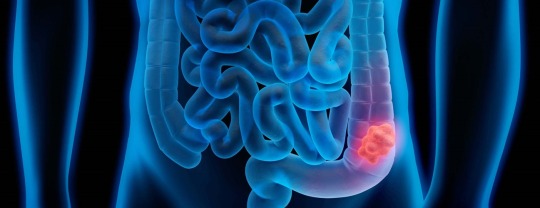
What is Colorectal Cancer?
Colorectal cancer is a neoplastic disease of the large intestine from Ileo-cecal junction till the rectum. Unregulated growth of their cell lining lead to polyps and cancers.
The exact cause of colorectal cancer is not known, but several factors can increase risk of developing colorectal cancer.
Age: Elderly people are at risk of colorectal cancer. It is most common in people over 50 years of age.
Family history: People with history of colorectal cancer in family (first degree relatives) are at increased risk.
Genetic factors: They are associated with some hereditary syndromes like lynch syndrome, familial Adenomatous polyposis, etc.
Lifestyle factors: A diet rich in red and processed meats and low in fibres or lacking fruits and vegetables can increase risk of colon cancer. Obesity, reduced physical activity, alcohol consumption or smoking also increase risk of colorectal cancer.
Medical Conditions: Certain medical conditions like inflammatory bowel disease (Crohn’s disease and ulcerative colitis) can increase the risk of colorectal cancer.
It is important to note that having one or more risk factors does not mean that a person will develop cancer. Regular screening tests such as stool occult blood and colonoscopy, can help to detect as well as prevent it at the early stage.
#Colorectal cancer#colon cancer#colorectal cancer#bowel cancer#sigmoid colon#rectal cancer#colorectal#stage 4 colon cancer#colon cancer treatment#adenocarcinoma colon#stage 4 bowel cancer#malignant neoplasm of colon#colon health#colorectal cancer treatment#bowel cancer treatment#the colon#colorectal carcinoma#rectal cancer treatment#rectal adenocarcinoma#sigmoid cancer#large intestine cancer#colonic neoplasm#rectal tumor#colon tumor#carcinoma colon#colorectal adenocarcinoma#large colon#cancer intestinal#colon rectum#sigmoid colon cancer
4 notes
·
View notes
Text
Gastroenterology Specialty in jaipur
Physicians who specialize in gastroenterology focus on the digestive systems of the human being. This is not just the stomach as some people may think. It is also the liver, pancreas, gallbladder, small intestine, esophagus and the colon. These doctors work to prevent and diagnose diseases as well as to offer treatments.
Testing often utilizes endoscopic equipment which is less invasive than other methods. Tubes and tiny cameras are inserted into nose, mouth and rectal areas in order to find out what is going on within the digestive tracts. Endoscopic procedures include the relatively common colonoscopy, and the less well known enteroscopy, ultrasonography and photodynamic techniques. Best Gastroenterologist in Jaipur
The colonoscopy is one of the more well-known procedures and has been recommended for patients over the age of 50 as routine screening devices. This procedure is no fun for the patient, that's for sure. But it does beat the alternative of undiagnosed disease. The preparation for this screening experience begins the day before. The patient will need to be on a "liquids only" diet with no solid foods eaten. Then the patient will have to drink a gallon of prep drink which is often flavoured with an artificial lemonade powder. Every twenty minutes or so, the patient will need to swig a glass of this concoction. It doesn't taste great but a person can drink just about anything for one day. It helps to chill the jug of juice and drink each glass rapidly. A person must be prepared to remain in the bathroom for a good portion of the rest of this day while the gallon of lemony liquid does its magic work of cleaning out the intestinal tract.
On the morning after this portion of the prep has been completed, it's time to head to the hospital. The patient must have a driver with her or him to drive them home after the colonoscopy has been completed. After arrival, the patient will be called back to a dressing room in order to disrobe and be readied for the operating table. Clad in a hospital gown, the person will be given a sedative intravenously and will then be fully ready for the procedure.
The individual will not be put under general anaesthesia but rather will remain in a twilight state. A camera and tubing will be inserted through the intestinal tract so that the doctor can inspect the region. The gastroenterologist will make certain that no suspicious lumps or bumps are present. Biopsies may be taken in order to be checked out further by the laboratory technicians. If everything is A-Okay, the patient will be given the thumbs up and released that same day. If suspicious findings are evident, further testing and treatments will be required. Gastroenterologist in Jaipur
Many gastroenterology screenings can save lives. Cancer of the pancreas, esophagus, liver and other digestive regions are often aggressive carcinomas and require rapid treatment after they've been identified. Other non-life threatening maladies treated by these specialists include Crohn's disease, colitis, IBS, malabsorption issues, swallowing difficulties and more. The intricate systems necessary for eating and nourishing one's body are complicated. If a person experiences problems in these regions, a competent gastroenterologist should be able to sort them out.
2 notes
·
View notes
Link
Most people in OKC feel worried about their overall health. And hence they focus on the best treatment plans. But there is something that demands their attention: colon cancer screening. Unfortunately, most Americans ignore this vital step and face the consequences later.
2 notes
·
View notes
Text
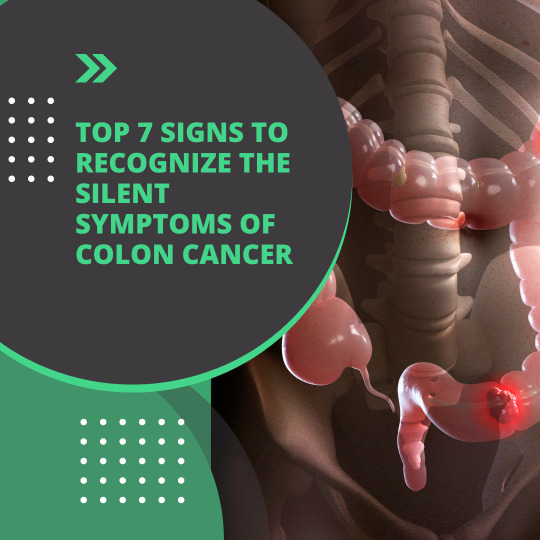
Top 7 Signs to Recognize the Silent Symptoms of Colon Cancer
Colon cancer is often called a "silent killer" due to its ability to grow and spread without noticeable symptoms, especially in its early stages. This stealthy progression makes colon cancer the third most common cancer worldwide and a leading cause of cancer-related deaths. However, early detection significantly improves treatment outcomes, with a 5-year survival rate of about 90% for localized colon cancer. Knowledge is power when it comes to recognizing colon cancer. Although the disease progresses quietly, it leaves subtle clues that, if detected, can lead to early diagnosis and life-saving treatment.
In this blog post, we'll explore the top seven silent symptoms of colon cancer. Recognizing these signs, no matter how trivial they seem, can help catch the disease early. Whether you're approaching the recommended screening age, have a family history of colon cancer, or want to be proactive about your health, this guide is for you. By understanding these quiet warnings, you can take steps to detect colon cancer early and improve your chances of successful treatment. Let's learn to recognize the early signs of colon cancer, because listening to your body's whispers today could prevent a more serious problem tomorrow.
The Unspoken Indicators of Colon Cancer
Colon cancer can manifest with various symptoms, but it's crucial to remember that these symptoms can overlap with many other less serious conditions. Here are some potential indicators that could suggest colon cancer:
1. Changes in Bowel Habits
One of the most common but often overlooked signs of colon cancer is a change in bowel movements. This include persistent constipation or diarrhea lasting more than a few weeks, stools that are pencil-thin or ribbon-like, or a feeling that your bowels don’t empty completely. These changes are your body’s way of signalling that something might be wrong in your colon. As a tumor grows, it can alter the shape of your colon or rectum, causing these symptoms. For example, a large tumor can narrow the passageway, making stools thinner, or a tumor near the rectum can create a feeling of incomplete evacuation. Remember, any significant, lasting change in your bowel habits deserves medical attention.
2. Blood in Stool
Blood in your stool is a symptom that's often more silent than you might expect, especially when it comes to colon cancer. Many people dismiss or miss this sign, even though it can be critical. Bleeding from colon cancer can appear in different ways. You might see bright red blood in the bowl, indicating bleeding from the lower digestive tract. Alternatively, stools may appear dark, almost black, resembling tar, which means the blood has traveled further through the digestive system from a tumor higher up in the colon. This symptom is particularly silent because the bleeding can be minimal and intermittent.
3. Unexplained Weight Loss
Unexplained weight loss often goes unnoticed, especially since losing weight is usually seen as positive. People might welcome it, thinking it's due to diet or exercise, even without changes. However, with colon cancer, losing 10 pounds or more over a few months is a warning sign. Constant weight loss because of colon cancer can indeed have a profound impact on mental well-being. Cancer cells consume a lot of energy, leading to weight loss despite normal eating. A growing tumor can also block nutrient absorption, causing malnutrition. Cancer can alter metabolism and reduce appetite. While losing weight without trying might seem lucky, it can signal a problem. Combined with other symptoms, unexplained weight loss is a significant warning of colon cancer.
4. Fatigue and Weakness
Fatigue and weakness are often dismissed but can be important signs of colon cancer, especially in our busy society. Feeling tired is common, but when fatigue is deep and persistent, not relieved by rest, it may be a warning sign. Tasks that were once easy might feel challenging, and simple activities can leave you drained. This fatigue can be linked to anemia caused by internal bleeding from the tumor, reducing oxygen delivery to your body. Your immune system working to fight the cancer also consumes energy. Additionally, there's an emotional toll from dealing with symptoms like discomfort or changes in bowel habits, contributing to fatigue. Many people overlook these signs, pushing through with extra caffeine or sticking to routines.
5. Abdominal Pain or Discomfort
Unlike the sharp pain of other conditions, it's more of a persistent, low-grade annoyance. It might feel like cramps, gas, or bloating, sometimes resembling common digestive issues. This makes it easy to mistake for something else, like stress or dietary problems. Over-the-counter remedies may offer little relief because the discomfort of Chronic Abdominal Pain comes from a physical source, a growing mass in the colon. This can create blockages, leading to ongoing discomfort. While not severe, it can still affect daily life, leading to changes in eating habits or social activities. When this discomfort persists without clear cause, it may be a warning sign of colon cancer that needs attention.
6. Unexplained Anemia
Unexplained anemia can quietly signal the presence of colon cancer, especially when it unexpectedly affects certain groups, like men or postmenopausal women. Anemia, particularly iron-deficiency anemia, occurs when there aren't enough healthy red blood cells to carry adequate oxygen to tissues. Symptoms like paler skin, shortness of breath, or cravings for non-food items may develop gradually, be easily rationalized, or be overlooked. This type of anemia often results from slow, chronic bleeding into the intestine caused by a colon tumor. The bleeding is subtle and may not be visibly apparent, but it gradually reduces iron levels, leading to anemia.
7. Change in Urinary Habits
Changes in urinary habits can be an unexpected sign of colon cancer, particularly if there's a tumor on the left side of the colon. Instead of focusing solely on digestive issues like bowel changes or rectal bleeding, it's important to also pay attention to urinary symptoms. Some people with colon cancer may experience increased frequency, urgency, or discomfort during urination. These symptoms can mimic those of a urinary tract infection (UTI) or other bladder issues, leading to misdiagnosis and delayed treatment. The true cause could be a tumor pressing against the bladder, but because urinary changes are less common and well-known as colon cancer signs, they might be overlooked by both patients and doctors.
Wrapping Up
Colon cancer often hides in the shadows until it reaches advanced stages, making it crucial to stay vigilant for subtle signs. These whispers from your body may seem insignificant, but they could be urgent pleas for attention. Don't dismiss them or attribute them solely to aging, stress, or diet. If you experience persistent symptoms or have health concerns, consult a healthcare professional like a Gastroenterologist in Pretoria without delay. Regular screenings offer the best defense, detecting precancerous polyps or early-stage cancers before symptoms arise. Early detection saves lives. Your awareness is your shield against the silent nature of colon cancer. By recognizing and addressing these subtle symptoms, you bring this hidden adversary into the light, where it can be effectively confronted.
0 notes
Text
Colon Cancer Screening Abu Dhabi
Early detection is crucial in the fight against colon cancer. For comprehensive colon cancer screening in Abu Dhabi, visit Dr. Haytham El-Salhat, one of the best oncologists in Abu Dhabi. Using state-of-the-art technology, Dr. El-Salhat provides thorough and effective screening options to detect potential issues early on. Ensure your peace of mind and health by scheduling your screening today. For more information, visit colon cancer screening in Abu Dhabi
0 notes
Text
FDA Committee Endorses New Blood Test for Colon and Rectal Cancer Screening
Source – CNN
A committee of experts advising the Food and Drug Administration (FDA) overwhelmingly voted in favor of a new blood test designed to screen individuals for colon and rectal cancers. Despite acknowledging certain limitations, the committee concluded that the test, known as Shield and manufactured by Guardant Health, was both safe and effective, with its benefits outweighing potential risks.
Addressing Low Screening Rates
The committee’s endorsement of the blood test comes in response to alarmingly low screening rates for colon and rectal cancers in the United States. With approximately 150,000 new diagnoses and an estimated 53,000 deaths attributed to these cancers annually, effective screening methods are critical for early detection and treatment. Currently, most screenings involve invasive procedures like colonoscopies or fecal tests, which may deter individuals from undergoing regular screening.
Convenience vs. Accuracy
Unlike traditional screening methods, the Shield blood test offers convenience for individuals with an average risk of colon and rectal cancer. With no need for extensive preparation, fasting, or anesthesia, the blood test presents a more accessible option for screening. However, experts caution that its accuracy falls short compared to colonoscopies, particularly in detecting precancerous growths that could be removed to prevent cancer development.
Balancing Risks and Benefits
While the blood test may miss certain precancerous growths, its potential to increase screening rates among individuals who would otherwise avoid traditional methods is seen as a significant benefit. The FDA committee weighed the risk of the blood test overlooking dangerous polyps against the likelihood of expanding screening accessibility and concluded that any form of screening is preferable to none at all.
Looking Ahead
If approved by the FDA, the Guardant Health blood test could revolutionize colon and rectal cancer screening by offering a convenient alternative for individuals at average risk. While acknowledging its limitations, proponents argue that increasing screening rates could ultimately save lives by facilitating earlier detection and treatment. As the FDA evaluates the test for approval, the hope is that it will provide a valuable tool in the ongoing battle against colorectal cancer.
Curious to learn more? Explore our articles on Enterprise Wired
0 notes